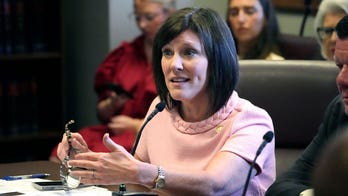Despite a series of setbacks, House Democrats plan to introduce a health care reform package Tuesday with the goal of passing the bill before Congress leaves for the August recess, House Speaker Nancy Pelosi said Monday.
Pelosi stayed optimistic as President Obama called anew on his congressional allies to push through comprehensive health care reform.
"We have to roll out this program this week," Pelosi told reporters at a press conference. "We will be on schedule to pass this bill before we leave for the August recess."
Pelosi suggested the delay so far in rolling out their package was nothing to worry about, quipping: "Welcome to the legislative process. In case you haven't noticed, this is how it works."
The president, while naming his new surgeon general Monday, seemed to recognize that during his travels overseas the health care reform push developed significant complications. But he used that backdrop to strengthen his call for action.
"I just want to put everybody on notice, because there was a lot of chatter during the week that I was gone," he said. "We are going to get this done. Inaction is not an option."
To pay for the Democrats' trillion-dollar health care plan, New York Rep. Charlie Rangel, chairman of the House Ways and Means Committee, on Friday called for new tax hikes on the wealthy.
Rangel estimated his proposal would generate $540 billion over 10 years and complement projected savings.
Under the plan, starting in 2011 individuals earning more than $280,000 a year, and couples making more than $350,000, would face a surtax on their adjusted gross income of 1 percent.
For individuals making over $400,000 a year, and couples making more than $500,000, the surtax would be even higher, though the exact percentage is unknown. It would be higher still for individuals making more than $800,000 a year, and couples clearing $1 million annually.
Rangel, D-N.Y., and Senate Finance Committee Chairman Max Baucus, D-Mont., were trying to sell the idea to Obama and administration officials who have distanced themselves from the idea. Health and Human Services Secretary Kathleen Sebelius called the idea one of many, a diplomatic way for the White House to put it at arms length.
Leading Democrats defended the plan, however, saying it only draws on wealthy Americans to finance the program and addresses concerns of fiscally conservative Blue Dog Democrats.
"To the extent that we can squeeze more out of the system for savings reduces the need for the (costs), but it will be at the high end, and not touch the middle class," Pelosi said. "We're trying to squeeze all the savings that we can out of this system first. And, rightfully so, many members in our caucus, including Blue Dogs, wants us to do that, and we share that view."
"We are asking about 1 or 2 percent of the American people who did really well under the Bush tax cuts to pay a little bit of a surcharge as we go through this transition," said Rep. Chris Van Hollen, D-Md.
But almost instantly, Republicans, and even some Senate Democrats, recoiled from the Rangel plan, suggesting more trouble ahead for House Democrats.
"Raising taxes on a group of Americans -- the majority of which are business owners in this country -- during the worst recession in 25 years is a profoundly bad idea," said Rep. Mike Pence, R-Ind.
Sen. Richard Durbin, D-Ill., also told ABC News' "This Week" that he thinks on the Senate side, "We're going to have a different approach."
FOX News' James Rosen and Chad Pergram contributed to this report.




